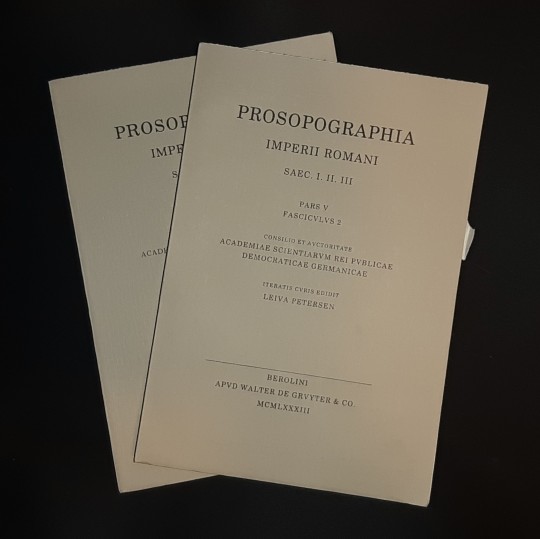Text
Prosopography
Prosopography [prah-sə-PAH-ɡrə-fee] Part of speech: noun Origin: Latin, late 16th century 1. A description of a person’s social and family connections, career, etc., or a collection of such descriptions. Examples of prosopography in a sentence “The sociologist used the prosopographies of different groups to study larger trends.” “My grandmother traced our family’s genealogy, and I used her…
#daily#definition#dictionary#educational#fun#Knowledge#laugh#learning#lesson#Prosopography#schoolhouse#vocabulary#word
0 notes
Text
if anybody is writing a historical fiction novel or trying to come up with names for their medieval-y tabletop RPG, there is a completely free online database of every single recorded inhabitant of england from the sixth through eleventh centuries. you can filter by occupation, among other things. it's very cool
#i'm posting this because i think prosopography is cool. more prosopography thank u#medieval history#anglo saxons#writing resources#do we feel great about the academic persistence of this term? no we do not. but it is still useful & also this project is 20 years old
36 notes
·
View notes
Text
tried to open my indexes to the works of ronald syme pdf and my entire laptop crashed. yay
8 notes
·
View notes
Text
Reise durch mein Bücherregal 📚

v.l.n.r.: Akademie der Wissenschaften der DDR (Hrsg.), «Prosopographia Imperii Romani» (UB -+)
#01164 · Dank diesem Werk wissen wir endlich, wie die „DDR“ auf Latein hieß, denn seine Herausgeberin ist die Academia Scientarum Rei Publicae Democraticae Germanicae.
Die Prosopographie ist eine historische Hilfswissenschaft, die einzelne Personen identifiziert und alle Spuren, die es über diese Individuen in den alten Quellen gibt, zusammenträgt. Sie befasst sich also nicht gerade mit Staatsmännern und Feldherren, über die die Zeitgenossen Bücher geschrieben haben, sondern über Nebenfiguren der Geschichte, die eventuell nur in einem Steuerbescheid auftauchen und dann wieder auf einem Grabstein. Oder in einer einzigen schriftlichen Quelle als Nebenfigur. Bei der Prosopographie handelt es sich also um die mühseligste Fleißarbeit, bei der ganz langsam biografische Daten zu Nachschlagewerken zusammengetragen werden. Das sieht man schon daran, über wie viele Jahrzehnte sich die Erscheinungsdaten der einzelnen Bände dieses Werks erstrecken.
Die bloße Existenz dieses Spezialfachs hat mich als Student der Alten Geschichte endlos fasziniert und als ich antiquarisch auf zwei günstige Bände einer Prosopographie des Römischen Reichs vom 1. bis zum 3. Jahrhundert gestoßen bin, habe ich sie in meine Büchersammlung aufgenommen. Die Nutzer*innen dieses Werks gehören einer kleinen Nische an, die ohnehin fließend Latein liest, so dass die beiden Bände 1983 bzw. 1987 in Latein verfasst sind – einschließlich Vorwort. Die Ränder der Bögen sind nicht sauber beschnitten, man muss die Seiten mit einem Brieföffner trennen, bevor sie sich aufblättern lassen. Trotz der mittelmäßigen Verarbeitung betrug der Neupreis (ausweislich der Reihen-Übersicht auf der Buchrückseite) um die 100,– D-Mark. Typische Abnehmerinnen waren wohl wissenschaftliche Bibliotheken, die die Bücher ohnehin als erstes zum Buchbinder geschickt hätten.
Wenn ihr zufällig Marcus Nummius Albinus heißt und auf der Suche nach einem Vorfahren seid, fragt mich ruhig – ich kann ihn in meinem Adressbuch nachschlagen (Pars V Fasciculus 3, No. 230).
0 notes
Text
nobody will understand this but: FUCK YOU CUSAS 30 by van soldt
#i hate this catalogue so much......#is it really so difficult to study PROPERLY kassite texts#the struggle of prosopography#especially akkadian prosopography#help.#sothis ships dimileth
0 notes
Text
the oxford dictionary of byzantium seems to be at odds with some of these prosopographies, which are further at odds with the book of ceremonies. youch
18 notes
·
View notes
Text
This website is so good if you need Old English names. PASE my beloved.
19 notes
·
View notes
Note
might be a silly question, but can you give any recs for readings on Plato and ancient philosophy in general for someone who haven't read anything from ancient philosophy outside from some Plato Dialogues and Aristotle metaphysics? Should I just go read Pierre Hadot?
Oh, please don't read Pierre Hadot. I mean, you can if you want I guess but he's very much the sort of person who went off and made a bunch of strong claims that are highly controversial and not really backed by evidence, but got repeated by many other people because they seemed interesting. Admittedly I'm biased since I do hate it when people try to draw parallels between philosophy and psychotherapy, but you generally want to stick more on the beaten path of interpretation than that.
I'd also shy away from most people who are recognizably famous philosophers; Heidegger or Derrida or Hegel or Popper's interpretations of Plato will usually tell you more about those people than they will about Plato, what you want are people who specialize in history of philosophy and/or classics, who can read the original Ancient Greek and publish papers and books mostly on the history of philosophy; People who are publishing in subject-specific encyclopedias such as the Oxford Handbook and Cambridge Companion are generally the people whose other papers and books you want to read.
For a general overview of ancient Greek philosophy (where I assume you'd want to start), I happen to like Peter Adamson's History of Philosophy Without Any Gaps, which was originally a podcast (which is still airing!) and now has been published into a series of books. Probably any other general history of philosophy published in the past 50 years by an academic historian of philosophy other than Bertrand Russell (a fine philosopher, but a useless historian) will be useful as well. But Adamson is good because he avoids over-simplification and doesn't gloss over, well, the gaps between Plato and Aristotle (4th century BCE) and Augustine (4th century CE) as many general histories of philosophy and even many treatments of Ancient Greek philosophy are wont to do.
Also, for more in-depth works, the HOPWAG website has a bibliography of academic works for every single episode that generally includes the cutting-edge books written by the most recent experts in the field. I rarely think I'd be able to come up with a better list or recommend anything that I think is a glaring omission for any subject I've read more in-depth on. These can, however, vary in difficulty and assumed background wildly, so don't get too discouraged if you download or borrow a book and it's referencing many people you're not familiar with or expecting you to read Ancient Greek - just go to a different source. At the risk of too much quartz and feldspars here, I generally think that most of the works cited there are pretty comprehensible for a beginner who has some knowledge of the basic Ancient Greek philosophical schools and people.
(I apologize if it seems like I'm leaning really hard on a podcast of all things here, I promise it genuinely is a really good resource run by a professional historian of philosophy and even with all of my reading beyond it, I'd simply be hard-pressed to outdo it!)
For Plato specifically:
I'd especially recommend The People of Plato by Debra Nails - This is a prosopography, which is a reference work that lists all of the people who appear as characters in the dialogues along with all of the other independent sources (i.e. from close to the time of Plato and not derived from the dialogues) attesting their existence, including inscriptions and other historical evidence that you'd never know about otherwise. As with any work like this, take any conclusion that seems like it's debating with and overturning prior scholarship with a grain of salt. But on the whole, for questions like "who is Lysis" or "who is Gorgias" it's generally a good resource.
Almost every work by Plato will also have several commentaries written by Plato scholars written in or translated into English, many of which will be from the past few decades and reflect the most recent scholarship. These are often rather technical and get more into the weeds than you might want if you haven't read the dialogue they're about, but they also will usually outline the dialogues and break them up into parts in a coherent and consistent manner, which makes for an easier time reading them even if you just skim the commentary.
Many of these authors assume a bit more background knowledge, but a few scholars I especially like are John Dillon (Heirs of Plato, The Middle Platonists), Holger Thesleff (Platonic Patterns), Harold Tarrant (Plato's First Interpreters, Thrasyllan Platonism). A lot of this probably reflects my own interests more than being a shortlist of the very best Plato scholars out there. But the history of ancient philosophy is not a terribly large field, it's somewhat easy to get an idea who the big names are and which people write accessibly and which ones are more difficult.
8 notes
·
View notes
Text
Current nonfiction reading is Hadrian: The Restless Emperor by Anthony Birley. It's a compelling biography of a complex and elusive figure, one of the most interesting (I think) of all the emperors. The literary sources for Hadrian's life and reign are nowhere near as good as we would like them to be--with Cassius Dio existing only in epitome for that period, we're thrown back on the always problematic Historia Augusta--but Birley is virtuosic at making sense of what evidence we do have, whether textual, epigraphic, or numismatic. He argues for Hadrian's love of Greek culture as a defining feature of his personality, while also pointing out that there were precedents for such attitudes in the reigns of Nero and Domitian--both of whom, like Hadrian himself, had poor relations with the Senate. Even if one sometimes gets bogged down in detail--be prepared for a crash course in prosopography as you try to follow the careers of Hadrian's many friends and foes--it's still well worth reading.
(I have only one real complaint. This volume, like its fellows in Routledge's series of imperial biographies, uses endnotes. I hate endnotes. Why, oh why, can't we use footnotes instead?)
26 notes
·
View notes
Text
Prosopographying a play by Jean Racine. Because of lesbianism.
3 notes
·
View notes
Text
need to write l. furius camillus prosopography...
#ficposting#hrrgh his family connections... so far its . his paternal line. his wifes family (caecilii metelli) and his mothers and sons family#(quinctilii) so i need to research like. what would be branching off from these connections to more second degree ones#weaving him into the intricate web of roman noble families.... uuoooghhh....#he was also perhaps vaguely involved as a supporter of sulla (but not really in the like. inner circle) so . ill have to figure out what#was going on with that... esp during marius and cinna... ough
3 notes
·
View notes
Text
youtube
One of my students in our (pre-printing press) Historical Methodology class made this video as part of his project. The assignment was to translate a medieval recipe from the Forme of Cury, the oldest surviving recipe book in English. And by translate, I mean learning the basics of paleography, plus glossary of unfamiliar terms. It may be English, but hardly what we use today. The class was designed by myself and my colleague, Dr. Martina Saltamacchia (the world's leading expert on the Cathedral of Milan), and this project is really her baby. Mine is on epigraphy and prosopography (perhaps predictably).
It's a fun class to teach, and sometimes we get a really dynamite presentation. This is missing his verbal "director's cut," but remains entertaining.
If you're considering an American university for a history major (and an ancient Mediterranean studies minor), this gives you a taste of ours (pun intended).
#historical methodology#Forme of Cury#paleography#history classes at the University of Nebraska Omaha#Youtube
3 notes
·
View notes
Text
i trust syme's prosopography over dubious shackleton bailey footnotes but most of all i trust the fact that if brutus DID have a half brother who fought on the opposite side of the civil war. lucan would NOT have been able to shut up about it. and yet lucan doesn't even mention this guy
15 notes
·
View notes
Text
i’m so funny because no matter how many people tell me “you cannot let this primary source be so mean to you that you spend hours on it reading every word” i always end up doing prosopography every time. who am i if not compiling biographical information about every person mentioned…
#when im reading burchard and have an index of names…… my index of names on my website…. et cetera#samael speaks
11 notes
·
View notes
Text



domino glazer ... google doc ✦ pinterest ✦ spotify
her walls are up — it’s all a facade ... say hello to the wildcard.
this is just the og app .. need to put it somewhere !!
\̲\̲ jodie comer, cis woman + she / her ] ⠀★ , no way, haven’t you ever heard of domino glazer? perhaps you know them best as wildcard spotted under new york's city lights, i’ve heard they’re a blackjack dealer & croupier at the halcyon / soldier that’s protected by the morenos, spilled blood for loyalty is thicker than water. the rumour goes that the thirty year old is known to be enigmatic and volatile, yet deft and adaptable. it’s wrath that’s their biggest vice, but hey, what do i fuckin’ know? their favourite song on the job is blue monday by new order and are never seen without a weathered polaroid of a tightrope walker beaming from great heights, hard to believe in superstition in such a godless city. ask the right people and they’ll tell you that they remind them of: studying a reflection unfamiliar in the remnants of a smashed mirror as you embody the elegant poise and echo the saccharine tone of an old hollywood starlet gracing the screen of a tiny black-and-white television ; rusted can tipped on its side — potent trail creeping up on a lone house swallowed whole by the glow of dastardly flames ; hand-bound notebook penned with aliases and elaborate prosopographies tucked beneath a floorboard concealed by an ornate rug rich in ruby & gold / amy dunne (gone girl), jack wilder (now you see me), debbie ocean (ocean’s 8), sarah manning (orphan black). so whatever you do, and may vengeance have mercy on you, do not fuck with them.
#pulptv.intro#just me nd a gradient against the world <3#trying 2 condense 4+ yrs of lore nd adding new things was a task#but ! i did it ! albeit not v well but u kno what we go forth#um also ... have fun on this rollercoaster ride <333
0 notes